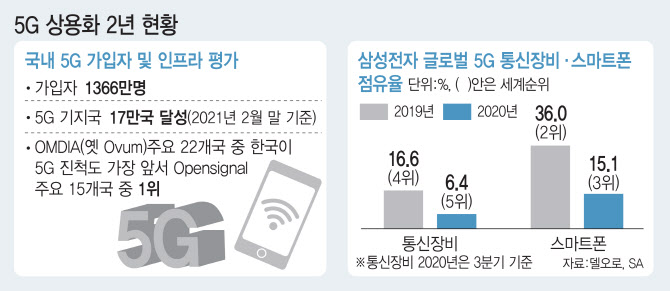|
Is it because it was commercialized too early? It is regrettable that the Republic of Korea, which commercialized the world’s first fifth-generation (G) mobile communication, was the first in the world at 11:00 p.m. on April 3, 2019, two years ago. 5G has been applied to factories, robots, cloud, and media to lead industrial convergence, but there are few services that can be experienced by the public.
Although 5G is becoming popular, the national score for 5G quality is not high, contrary to the positive evaluations of leading foreign research institutes. In particular, Samsung Electronics’ share in the global 5G communication equipment and terminal market, which the government put forward as the cause of the world’s first 5G commercialization, continues to decline.
Nevertheless, experts advise that next-generation telecommunications fields such as 5G and 6G should not be abandoned. This is because the 4th Industrial Revolution will take place through the next-generation communication network, and the possibility of expanding the market for domestic equipment industries such as Samsung is still high as sanctions against Huawei in the United States continue.
5G used by 1.36 million… The overseas research institutes are of good quality,
According to the Ministry of Science and ICT, as of the end of February, there are 1.36 million domestic 5G subscribers and 170,000 5G base stations. One in five citizens is a 5G subscriber.
The quality of 5G in Korea is recognized overseas, as OMDIA (formerly Ovum), a global research institute, evaluates that Korea is the most advanced in 5G progress among 22 major countries, and Opensignal is the first in quality among 15 major countries.
However, dissatisfaction remains, as consumers disappointed with the quality of the initial commercialization created a ‘5G Victims’ Naver Cafe and prepared a class lawsuit. This is because 5G has been quickly commercialized without sufficient field tests to increase the global competitiveness of domestic communication equipment and terminals. Although the quality is improving, considerable efforts are needed to reverse the negative perceptions of consumers about 5G.
|
5G equipment market share decline… Concerns about unconditional post-communication
The world’s first commercialization of 5G in the Republic of Korea is the work of Young-min Yoo, then Minister of Science and Technology Information and Communication (currently the Chief Secretary of the President) and KT Chairman Hwang Chang-gyu, who was from Samsung Electronics. Even if consumers are a little anxious, the goal was to elevate Korea’s leadership in the global IT market by letting our telecommunications companies beat 5G with our handsets and our equipment.
Thanks to this, Samsung Electronics temporarily occupied the first place (37%) in the global 5G equipment market from the fourth quarter of 2018 to the first quarter of 2019. However, at the end of 2019, it fell to 4th place (16.6%) and 5th place (6.4%) in the third quarter of 2020.
Was telecommunications carriers only good with 5G? Revenue per subscriber (ARPU), which had declined due to an optional contract discount (25% rate discount), has turned around thanks to the popularization of 5G. At the same time, by the third quarter of 2020, it has invested in infrastructure of 5G, the largest ever, of KRW 5.2 trillion, but it is insulting. An official from Samsung Electronics said, “After telecommunications companies are scolded by consumers with 5G, they are crying out for platforms or AI rather than advancing network infrastructure. It’s not desirable.”
|
|
Talents are driven by AI… Re-establishing the next-generation telecommunications phase
The Ministry of Science and ICT said it would grow’D (data), N (5G and 6G networks), and A (artificial intelligence)’ to become a digital powerhouse, but developers’ interest in the network is decreasing. The negative perception of 5G is driving young talents to focus on AI instead of next-generation network development.
However, the communication (network) avoidance of graduate students is not correct considering the trend of 5G as a platform that converges with software and computing technology.
“Computing technology is very important in next-generation communication networks such as 5G-based robots and mobile edge computing linked to 5G,” said Professor Kyung-han Lee of the Department of Electrical and Electronic Engineering at Seoul National University. Preemptive movement is required, such as a large number of supplements. The lack of human resources could shake the industrial competitiveness of Korea, the world’s leading network infrastructure powerhouse.”
The Institute for Information and Communication Planning and Evaluation (IITP) created eight new university ICT research centers this year and selected two of them as the next-generation telecommunications field. IITP Human Resources Development Director Shin Jun-woo said, “AI has been cultivating human resources through a lot of investment from two or three years ago. Next-generation communication and network fields will also designate two of the university’s ICT research centers this year to cultivate human resources. As more than 40 graduate students participate, the shortage of manpower will be slightly resolved.”




